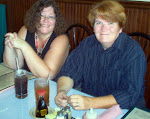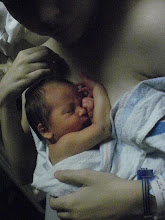 |
Pretty much what
Dad's socks looked like.
I should have taken a picture
of them!
|
First night we were all in there together, exhausted, Mom and I were both sound asleep and he made it out of bed by himself, to of course use the bathroom. Weak and shaky, he didn't make it and, poor man, had a major accident. The staff caught him and there was a major uproar - which I slept through, but finally woke Mom up. We both fussed at him the next day. He remained unmoved by our anger or fears. He, dammit, did not need help. Much stress was had and shared all around.
Until the Dr. came in to see him that morning.
Evidently, the nurses and staff had reported Dad's incident during the night, and the Dr. came down on Dad in no uncertain terms, that he was to call for assistance EVERY time he wanted to get up, because if he didn't and he fell, the results would be "catastrophic", to quote the exact word the Dr. used.
At this point I piped up and asked if the Dr. would define "catastrophic" in these circumstances. Which he did. Evidently, given the high dose of blood thinner that Dad was on, to dissolve the blood clot in the brain, if Dad were to fall, it would be fatal, it would kill him, from internal bleeding.
*THAT* got Dad's attention, or so we thought. His grumping faded to inaudible mutters and he grouchily allowed us to push the call button from there on out. Battle won...or so Mom and I thought. However, no. We weren't out of the woods yet.
Whenever Dad woke up - and not just at night, but when he napped during the day, which he did a lot of - he would wake up confused and foggy...and promptly proceed to get out of bed on his own and become furious when thwarted. In a sense, it wasn't his fault. He was so groggy from sleep that he did not track things or remember where he was or what he was supposed to be doing. At that point, we started stationing a family member (several of my brothers were in and out to see him and visit and support mom and me) with him when we went to the cafeteria to eat, because we did not trust him to stay put and behave if he had just waked up.
This led to a number of memorable occasions, the first, when I stayed with him while my mom and oldest brother went to supper...and Dad woke up and - completely out of it - tried to scramble to his feet. That round finished up with me desperately hanging on to the back of Dad's hospital gown to keep him on the bed, while frantically pushing the call button, as he howled at me. Oy. Things I never thought I'd be doing, I have to say.
The second memorable one was in the middle of the night, with Dad, once again, fogged from sleep wanting to get up and use his pee bottle (I assume there is an official name for those things), which he preferred to stand up to do. I was not, repeat, NOT to hit that dad-blamed button, and I was to hand him the %$#@ bottle! Immediately! Of course...I hit the button. More fussing and language ensued. Demands for the bottle. The room was dark, and the pee bottle was hanging on the edge of the bedside table. He couldn't see it, but I could and I just told him I had no idea where the bottle was, and he'd have to wait. Much fussing and fuming. The nurse showed up and we got him assisted and handled.
I have to point out, that when Dad was awake, he would hit the call button or ask us to do so, even if he wasn't thrilled about it. It was only when he woke up, foggy from sleep and disoriented that he got out of control. And while we were stressed and freaked out, and yes, furious with him, we did understand that this was not entirely his fault. Also, his anger and the extremely uncharacteristic profanity - up until then I'd heard him say two swear words in my hearing in my entire life! - was also symptomatic of the stroke. Anger issues and rages and emotional outbursts tend to follow a stroke, and the stroke victim has no control over it, may not even really be aware they are doing it. So we tried very hard to be patient with him. I can't say we were always successful, because we were pretty terrified, given that definition the Dr had given us of catastrophic!
As the week went on, each day with him fussing to go home and stating this was the day he was going home, and bitterly disappointed when he couldn't, I learned something new about my Dad's past.
Dad has always been leery about hospitals and hospital stays. He will just barely tolerate staying over night. Or having someone he loves in his family stay over in a hospital. He was furious last year, when my Mom, who'd had a pulmonary embolism that could have killed her and probably did come close to doing so, was kept over a second night on oxygen. She was so weak, she had difficulty walking down the hall and back, their test to see if she could go home safely. They assisted her back to bed, and while they were tucking her in, Dad boiled over, saying it was their fault that Mom couldn't go home, they'd made her walk too fast, and he was going to take her out of here - at which point, I turned and told him to shut up and had he lost his mind! I did this deliberately. I figured if he was fussing at me, he wasn't yelling at the staff and causing a bad situation. And let me tell you, I felt really weird doing it, because I have always treated my Dad with deep respect.
Mom finally looked over and saw us about to boil over, and asked what was going on. We both dodged and said that nothing was, where upon she said that she really didn't want to go home, feeling the way she felt, and would prefer to stay here. That brought that to a halt, and he settled down. (Mom by the way, is fine, healed up and no longer has to use an oxygen tank. This has been quite an eventful year or so.)
But I was shocked by his anger and unreasoning desire to get out of the hospital at all costs. I mean if it were Dreamweaver, my wife, in the hospital having almost died and still in danger, I'd be begging them to keep her, until she was better and safe!!!
During this week in the hospital with Dad and his stroke, I caught a glimpse of what may have been a clue to my Dad's almost pathological fear of hospital stays. Dad and I were talking, as we sat together, me by his hospital bed, and he told me this story of his childhood, which I had not heard before, or at least not in full. He was born in 1927, the youngest of 10 children, and his mother - my grandmother - lived to be a little over a hundred. When he was a young boy, he fell and broke his arm, rather badly. His mom took him to their family Dr, who concerned about the severity of the break, offered to have dad admitted to the hospital and anesthetized for it to be set.
Evidently, his mother hit the roof. NO child of hers was going into the hospital over night for any reason and that was THAT! End of story.
Well. Think about it.
Back then, people who went into the hospital often didn't come home. It was a place you went when things were fatally serious, and terrifying. All of his mother's children, including him, were born at home. She managed to pull all of her children of the time - before Dad was born, obviously - through the 1918 - 1920 flu pandemic, though she was told that she and the children would die. A tale to terrify any child. And she did it at home nursing them from her own sick bed. She was a tough woman, but I suspect that hospitals were a terrifying thing for her, implying the possibility of death in those days - which was probably more true than not, and she vehemently refused to have Dad admitted to one. Loudly. In his hearing. That had to be frightening!
I suspect as a young child this made a permanent terrifying impression on him, and stayed with him subconsciously all his life, shaping his reactions to hospitals. And I think, as he has gotten older and more rigid and less flexible (not that he ever WAS particularly flexible in the first place, mind you.), that this has become more and more of an issue, rising up from that childhood experience.
So, I learned something about Dad, that was sort of a key, to understanding him and what was going on inside him. Even if, in the wake of the stroke, he could not have understood it, himself.
It made it a little easier to deal with him, as he obstinately grouched his way through being in the hospital for a week. Part three on the way tomorrow.















































No comments:
Post a Comment